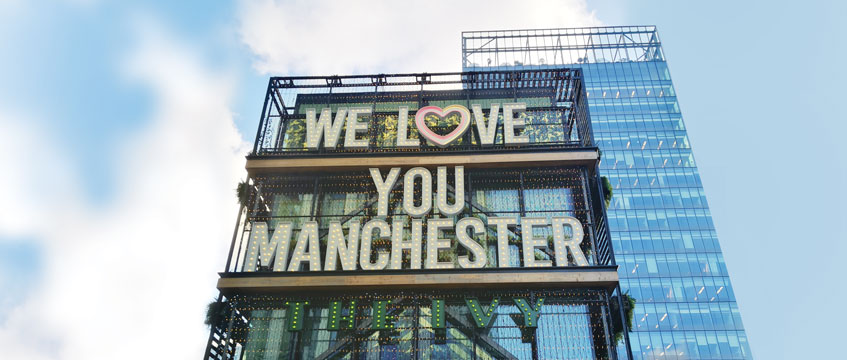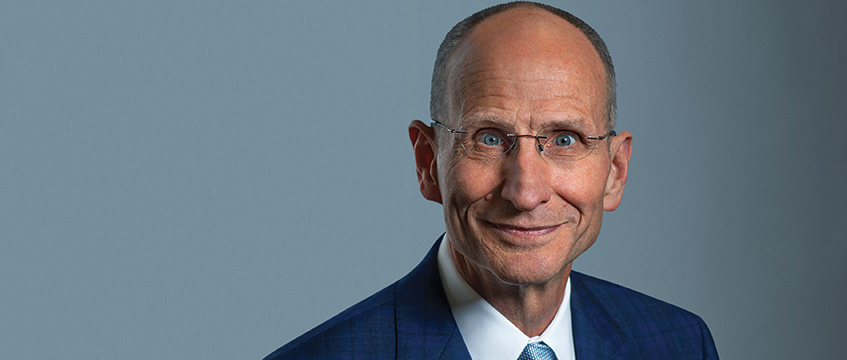Is Manchester on the cusp of being a truly grown-up city?
Every city in the UK will need to be reborn in some way after a year of lockdowns during the coronavirus pandemic. But could Manchester come back as a bigger, better, more adult city? Samantha McClary finds out.
Andy Burnham, mayor of Greater Manchester, says there is nowhere in the world quite like Manchester. Its people are warm, compassionate and brimming with talent, he says. Which, of course, you would expect a mayor to say. But he also says that the city hasn’t quite achieved everything it is capable of. At least, not yet.
“We’re a city region with a great future,” says Burnham. “But I think in some ways, like other English cities, we’ve maybe not fully punched our weight because of the way the country has always worked and been a bit overly London dominated. But as levelling up takes effect, Greater Manchester will more and more come into its own.”
Every city in the UK will need to be reborn in some way after a year of lockdowns during the coronavirus pandemic. But could Manchester come back as a bigger, better, more adult city? Samantha McClary finds out.
Andy Burnham, mayor of Greater Manchester, says there is nowhere in the world quite like Manchester. Its people are warm, compassionate and brimming with talent, he says. Which, of course, you would expect a mayor to say. But he also says that the city hasn’t quite achieved everything it is capable of. At least, not yet.
“We’re a city region with a great future,” says Burnham. “But I think in some ways, like other English cities, we’ve maybe not fully punched our weight because of the way the country has always worked and been a bit overly London dominated. But as levelling up takes effect, Greater Manchester will more and more come into its own.”
It’s a belief that resonates through Manchester’s people – both residents and professionals. The city has built itself back up before, from the Arndale bomb in 1996 to the more recent Manchester Arena attack.
Manchester does not give up, it rises up. And for many in the real estate sector, the city is coming into its own and refusing to compare itself with London – or any other global city – any longer.
The Future of Manchester – a dynamic production
Future of Manchester speakers:
Andy Burnham, mayor of Greater Manchester
David Ancell, director, Vita Group
Chris Cheap, regional managing director, Avison Young
Lou Cordwell OBE, chair, Greater Manchester Local Enterprise Partnership
James Evans, director and head of office, Savills
Dan Hyde, senior development manager, MEPC
Michael Ingall, chairman and chief executive, Allied London
Daniel Monaghan, partner, Shoosmiths
Andrew Pattinson, head of real estate north, Shoosmiths
Tom Whittington, director, Savills
Louise Wyman, strategic director of growth and development, Manchester City Council
A more complete city
For Chris Cheap, Avison Young’s head of UK regions, the city is metamorphosing into something more complex, more complete and more grown-up.
“The boundaries of the traditional city centre in a real estate context are getting pushed in all directions,” he says. “We’re seeing a number of different communities growing up throughout the city, self-sustaining communities, which means that the city is not reliant on one retail core like it always has been. Now we have a collection of quarters across the city that have their own personality and are able to reflect, appeal to and attract different sectors.
“It’s a really interesting time for Manchester, because we are on the cusp of becoming a truly grown-up city.”
James Evans, head of office at Savills Manchester, agrees. He says the maturing nature of the city is being shown in the stock it is bringing to market and has continued to develop despite the pandemic.
He points to projects such as AEW Europe’s Barbirolli Square in the city centre, which is being refurbished to appeal to Manchester’s newest set of tenant groups – and the demands of a new, more empowered workforce.
“One of the definite trends we’re seeing at this early stage is a flight to quality. Anecdotally, about two-thirds of all the enquiries we’ve taken for office space out of our Manchester office this year have been from occupiers seeking to go up the quality ladder and consequently prepared to pay more rent to get into the best type of space,” says Evans. “There’s an acceptance that if you are going to get people back from their home offices or their spare bedrooms, they want to be in a much, much better working environment than they were previously happy with.
“Recessionary times often lead to a flight to value, and the Manchester market is no different in that regard,” he adds. “But this time around, a flight from value is what’s coming into sight. And what does that actually mean for space? It means those landlords that are developing great spaces, constructing new buildings or carrying out refurbishments have got to think really hard about the type of space they produce.”
We will be at the forefront of levelling up, no question about it
Andy Burnham, mayor of Greater Manchester
The spaces in between
And it is not just about the space being produced, but the spaces in between too.
At Noma to the north of the city centre, where Federated Hermes and MEPC have more than 1m sq ft of new development in the pipeline, senior development manager Dan Hyde says the enforced homeworking experiment the nation has endured has led the team to think differently about how their spaces – and the “Nomahood” – work.
“Gone are the days that you just cram as much square footage on a site as you can and make as much money as you can,” says Hyde. “The focus really is on the public realm and the green spaces in between buildings. We’re really fortunate at Noma as we have the most green space of any quarter or any neighbourhood within Manchester, and we really want to capitalise on that to make it a place where people can come and be inspired and just enjoy themselves.”
This focus on people and creating a city that attracts talent and fosters working together is what should enable Manchester to build back better.
“We’ve been amazingly fortunate,” says Louise Wyman, strategic director of growth and development at Manchester City Council. “Throughout the pandemic, the office market has held up. We had 35 completions of major schemes in the past year, compared with 2019 when we had 27 completions. But we’ve had to do an awful lot of work behind the scenes.”
There’s a huge amount of collaboration, there’s a huge amount of goodwill
Louise Wyman, Manchester City Council
Spirit of collaboration
Wyman says one of Manchester’s core strengths is its partnership model and collaborative approach.
“Everything we do when we develop economic plans and sustainability agendas we do in partnership with our business sounding board and the investors and anchor institutions that we have across the city,” says Wyman. “There is something in the people of the city. You look at how we responded to the Arndale bomb, how we responded to the arena bomb. There’s an amazing business community that comes together and puts social value, that puts the future and the resilience of the place, at the forefront of a shared agenda.
“Yes, it’s a competitive market – it is wherever you go. But there’s a huge amount of collaboration, there’s a huge amount of goodwill. We’ve got a very fortunate mix of the people who drive the future of the place.”
“Developers have played a massive role in making Manchester what it is today,” adds Andrew Pattinson, head of real estate north at Shoosmiths. “Over the past 25 years, Manchester has seen exponential growth. It has massively changed. This started with a vision from Manchester City Council but has developed by working closely with developers.”
It is that collaboration, says Pattinson, that has enabled Manchester to transform some of its most unloved parts into the new quarters of the city – the new communities, each with their own personalities and purposes.
“What I’ve seen in Manchester over the past few years has been huge swathes of undeveloped, post-industrial wastelands which, together with bodies like the Northwest Regional Development Agency, have been developed,” says Pattinson. “They’ve taken the old mills and the canal systems and made them into great places to live, alongside the developers who’ve been able to provide the new-build, the retail and the offices. And it all works well together.”
And, according to the mayor, that is only just the start of it for Manchester and for its built environment community.
“It’s going to see rapid change. I am absolutely certain of that,” says Burnham. “We’re going to be unrecognisable as a city in 10 years’ time. And there is a massive opportunity for people to be a part of it.
“We will be at the forefront of levelling up, no question about it. With or without the government support, we’re getting on with it. And we’re looking for partners that want to be part of the long-term journey, not fair-weather friends. We want long-term partners – and I know there’s no shortage of them out there.”
See also…
Click here to read the latest news on Manchester, and subscribe to the EG Property Podcast on any of your favourite podcast players for more from EG’s Future of Cities series.
To send feedback, e-mail samantha.mcclary@egi.co.uk or tweet @samanthamcclary or @estatesgazette
Main photo © Samantha McClary











